Overview of Operating Costs of Oil-Fired Steam Boilers in Chemical Plants
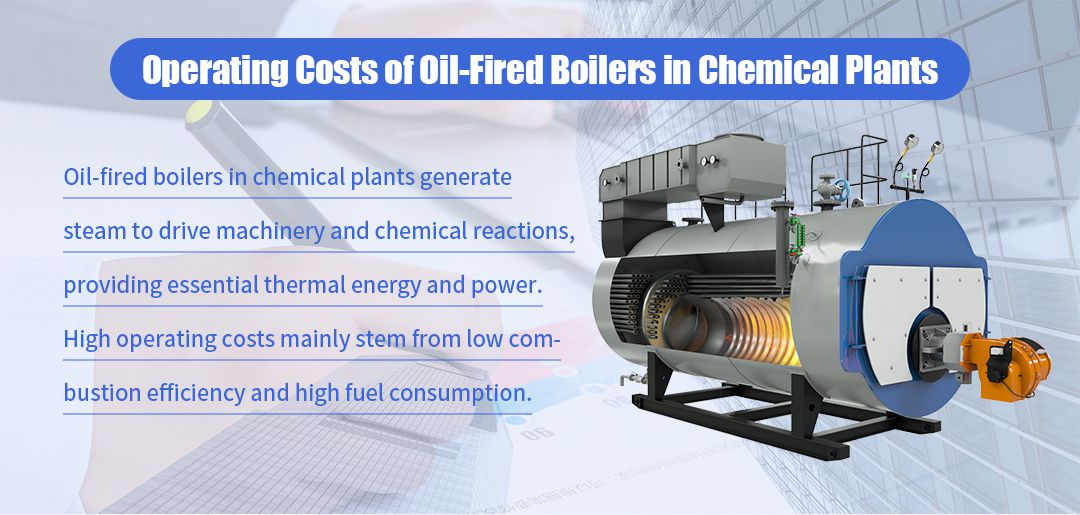
Oil-fired steam boilers are crucial equipment for thermal energy conversion in chemical enterprises. They heat water into steam or hot water by burning diesel, heavy oil, and other fuels to meet the heat demand in chemical production. This process includes fuel combustion, heat transfer, water circulation, and the output of steam or hot water.
In chemical production, oil-fired steam boilers play a vital role by providing steam or hot water for reactors, dryers, and textile machinery, maintaining the necessary temperature conditions. Efficient boiler operation can enhance production efficiency, minimize interruptions, and ensure product quality. Additionally, their flexibility can meet various chemical production needs, ensuring continuous and stable operation.
In chemical plants, the high operating costs of oil-fired steam boilers are a major concern, compressing profits and hindering sustainable development. These costs stem from significant fuel consumption, price volatility, expensive maintenance, low energy efficiency, and increased environmental investments. These challenges necessitate a balance between efficient production and cost control. Thorough analysis and cost reduction strategies are essential to improve operational efficiency and enhance competitiveness. EPCB Boiler will next provide a detailed analysis of the causes and propose improvement measures.
Understanding Operating Costs of Oil-Fired Steam Boilers
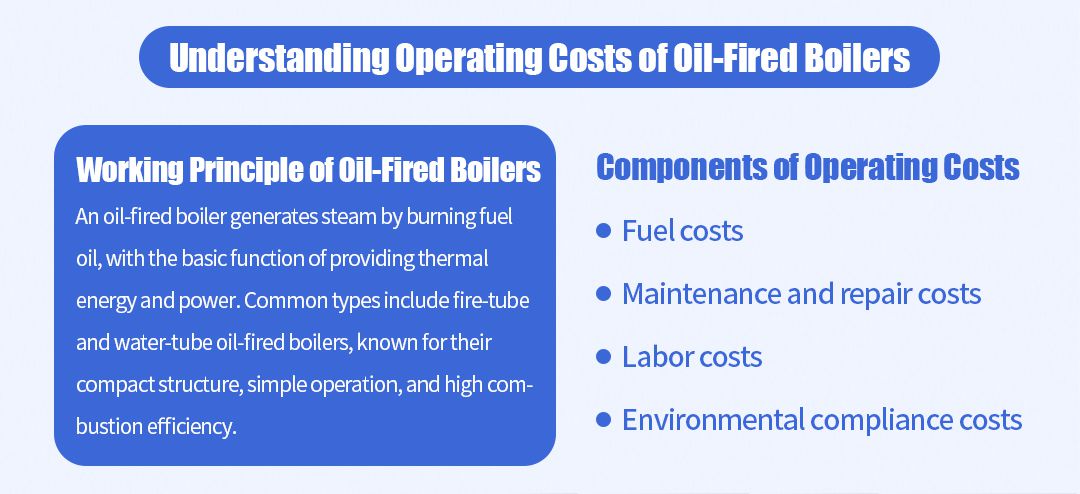
Working Principle of Oil-Fired Steam Boilers
Oil-fired steam boilers use oil (such as diesel, heavy oil, or residual oil) as fuel. Through combustion, the chemical energy of the fuel is converted into thermal energy, heating water into steam or hot water for heating, hot water supply, or industrial production.
Basic Functions of Oil-Fired Steam Boilers:
1.Thermal Energy Conversion: Efficiently convert the chemical energy of oil into thermal energy.
2.Water Heating: Use thermal energy to heat the water in the boiler to the required temperature or convert it into steam.
3.Thermal Energy Supply: Provide stable thermal energy for heating, hot water supply, or industrial production.
Common Types of Oil-Fired Steam Boilers and Their Characteristics
Fire Tube Oil-Fired Steam Boiler: In this type, the smoke generated by combustion flows through preset smoke tubes, heating the water or steam-water mixture outside the tubes. Advantages include stable steam production and low water quality requirements, while disadvantages are large water capacity and slow steam output.
Water Tube Oil-Fired Steam Boiler: Water flows inside the tubes, while fire and flue gases outside the tubes heat the water inside to generate steam. Advantages include smaller footprint and quick startup, while disadvantages are lower steam dryness, high flue gas temperature, frequent start-stop, high water quality requirements, need for chemical oxygen removal, and susceptibility to tube rupture.
Forced Circulation Once-Through Oil-Fired Steam Boiler: This type has a steam generator composed of a coiled tube where water flows rapidly, producing steam immediately. Usually vertical, with the burner at the bottom. Advantages include safety, quick startup, high thermal efficiency, and moderate water quality requirements.
Components of Operating Costs
Fuel Costs: The primary operating cost, influenced by fuel prices, boiler efficiency, and operating time. For example, a one-ton oil-fired steam boiler consumes about 60 liters of diesel per hour. If diesel costs 5 yuan per liter, the hourly fuel cost is 60 liters × 5 yuan/liter = 300 yuan.
Maintenance and Repair Costs: Ensuring the boiler's normal operation and extending its lifespan. Maintenance includes:
1.Daily Inspection and Maintenance: Checking burners, flues, water level gauges, etc.
2.Periodic Overhaul: Major repairs based on operating time and manufacturer recommendations, replacing worn parts.
3.Cleaning and Maintenance: Regularly cleaning the boiler, combustion chamber, and flue.
4.Spare Parts: Stocking consumable and critical parts to minimize downtime.
Labor Costs: Related to the operation, maintenance, and management of the boiler, including wages for operators, management staff, and training expenses. Operator wages are influenced by region, company type, and individual skills, while management staff are responsible for managing and supervising the boiler room. Additionally, companies need to regularly train and assess operators to improve their skills and safety awareness.
Environmental Compliance Costs: To meet environmental regulations, companies need to invest in environmental compliance. This includes:
1.Environmental Equipment Investment: Installing flue gas desulfurization, denitrification, and dust removal equipment.
2.Emission Fees: Paying emission fees as per local regulations.
3.Environmental Monitoring Costs: Regularly monitoring the boiler's flue gas emissions.
4.Training Costs: Training operators on environmental regulations and equipment operation.
Methods to Reduce Operating Costs of Oil-Fired Steam Boilers
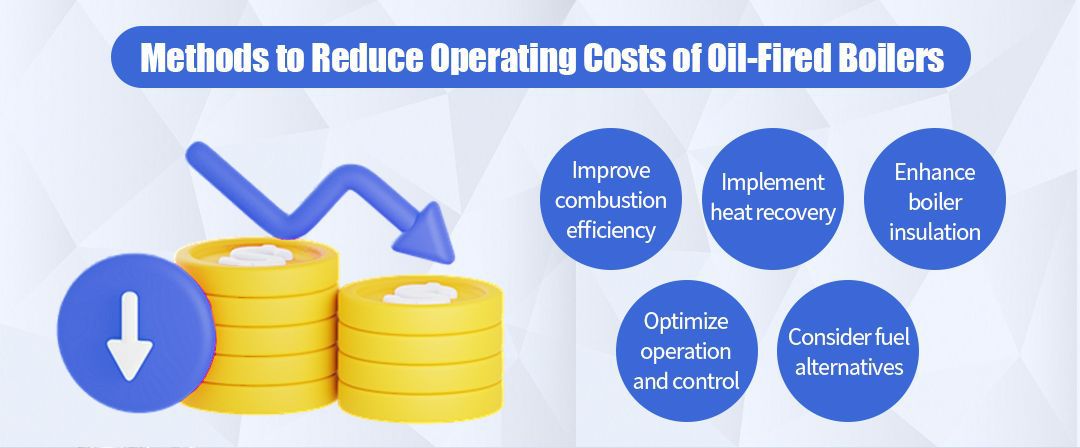
Improve Combustion Efficiency
Optimize Combustion Control System: Implement advanced control systems such as PID controllers, fuzzy logic, and neural network algorithms to monitor and adjust the air-to-fuel ratio in real-time, ensuring the optimal stoichiometric ratio and reducing incomplete combustion and heat loss. Additionally, install flue gas oxygen content monitors to adjust the combustion air volume in real-time, ensuring complete combustion and improving thermal efficiency.
Heat Recovery
Install Waste Heat Recovery Systems and Condensing Economizers at the boiler's exhaust. Waste heat recovery systems include heat exchangers and heat pump technology. The former recovers flue gas heat to preheat boiler feed water or heat other process fluids, reducing energy consumption; the latter recovers low-temperature waste heat, enhancing thermal energy recovery efficiency. Condensing economizers utilize high-efficiency condensation technology to lower flue gas temperature below the dew point, improving thermal efficiency, reducing acid gas emissions, and providing significant environmental benefits.
Improve Boiler Insulation
Enhance Boiler Insulation to reduce operating costs by using low thermal conductivity, high-temperature-resistant insulation materials such as aerogels and vacuum insulation panels to minimize heat loss from the boiler shell. Regularly inspect and maintain insulation layers, repairing or replacing damaged or aging parts to ensure effective insulation. Additionally, improve the sealing between boiler components to reduce thermal bridge effects and enhance overall insulation performance.
Optimize Operation and Control
Optimize Boiler Operation and Control to reduce operating costs by implementing distributed control systems (DCS) or programmable logic controllers (PLC) for centralized monitoring and intelligent control of boiler operations, enhancing stability and efficiency. Utilize IoT technology for remote monitoring and fault diagnosis to promptly identify and resolve issues, minimizing downtime. Employ big data analysis to deeply analyze boiler operation data, optimizing operational parameters and improving energy efficiency.
Fuel Substitution
Fuel Substitution can lower operating costs by considering the use of more economical and environmentally friendly alternative fuels such as biomass fuels (e.g., wood chips, straw) and natural gas. Biomass fuels are widely available and renewable, achieving carbon neutrality during combustion. Assess the feasibility and cost-effectiveness of fuel conversion, including technical evaluation (analyzing whether existing boilers can support new fuel combustion and if modifications are needed), economic analysis (comparing various costs of new fuel with the original fuel), and environmental impact assessment (considering types of emissions and treatment methods) to ensure compliance with environmental regulations.
EPCB Case Study: Successful Practice in Reducing Operating Costs of Oil-Fired Steam Boilers
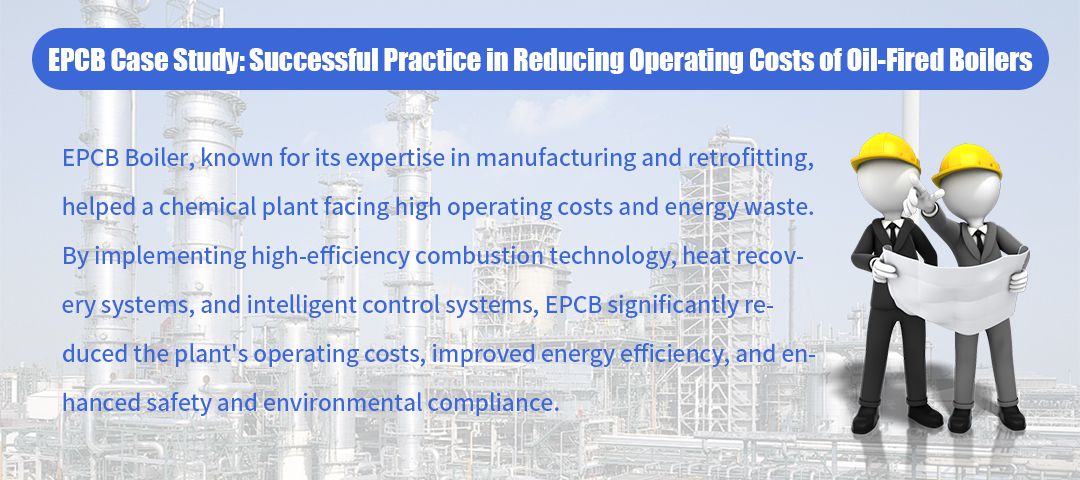
EPCB Boiler, a professional industrial boiler manufacturer based in Qingdao, specializes in the design, manufacturing, sales, and installation of coal-fired, biomass-fired, CFB (Circulating Fluidized Bed), oil and gas boilers, and pressure vessels. The company's products meet the highest international standards, certified by ISO9001:2000, ASME, and CE, ensuring exceptional quality.
Project Background
A chemical plant client faced the issue of high operating costs for their oil-fired steam boiler. Global energy price fluctuations and stringent environmental regulations necessitated urgent cost reduction, improved energy efficiency, and compliance with environmental standards. Specific challenges included high oil consumption, low energy efficiency, environmental pressures, and safety risks associated with aging boilers.
Solutions Provided
EPCB tailored a comprehensive solution for the chemical plant client to reduce costs and enhance energy efficiency, including the following key measures:
Replacing with High-Efficiency Oil-Fired Steam Boilers: Implementing advanced combustion technology and control systems to improve combustion efficiency and reduce fuel consumption.
Integrating Heat Recovery Devices: Recovering waste heat to preheat combustion air or process water, thereby reducing energy consumption.
Introducing Intelligent Control Systems: Achieving automated control and optimized regulation of the boiler to improve energy utilization efficiency.
Upgrading the Emission System: Using advanced flue gas purification technology to ensure emissions meet environmental standards.
Comprehensive Safety System Upgrade: Adding multiple safety protection devices to enhance operational safety and reliability.
Results and Benefits
By implementing EPCB Boiler's solution, the chemical plant client achieved significant economic and social benefits:
Reduced Fuel Consumption: The high-efficiency oil-fired steam boilers and heat recovery systems significantly reduced fuel consumption, saving hundreds of thousands of yuan in annual operating costs.
Improved Energy Efficiency: The intelligent control system increased energy conversion efficiency by approximately 15%, enhancing production efficiency.
Ensured Safety and Environmental Compliance: The safety system and emission system upgrades ensured operational safety and environmental compliance, reducing legal risks.
The client expressed high satisfaction with EPCB's products and services, acknowledging the significant economic and social value created by EPCB. They also indicated their intention to continue the partnership to promote energy conservation, emission reduction, and sustainable development.
Additional Advantages of Upgrading Oil-Fired Steam Boilers
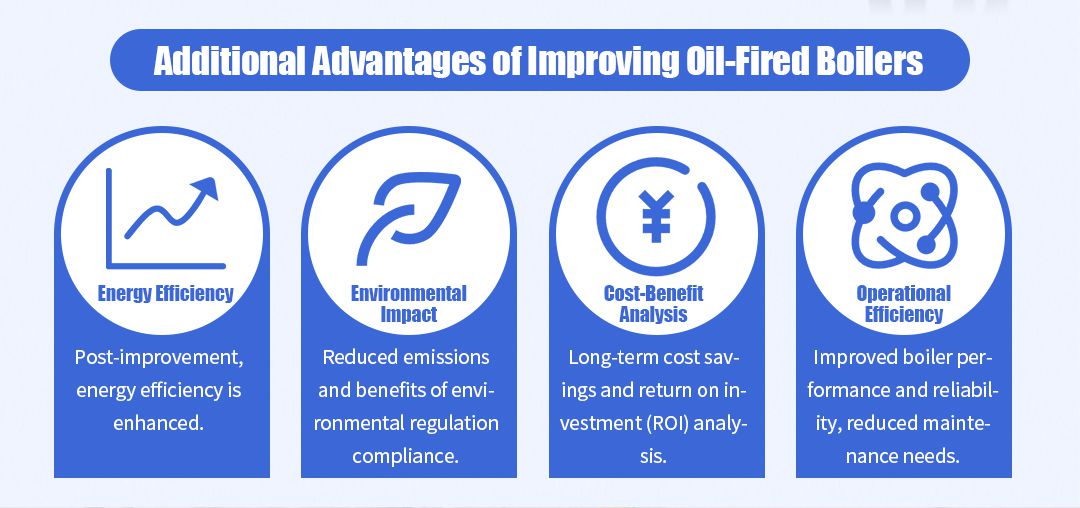
Improve Energy Efficiency
Case 1: A factory upgraded its existing oil-fired steam boiler by installing advanced combustion control systems and heat recovery devices. After the upgrade, the boiler's combustion efficiency increased from 80% to 92%. This significant improvement means that the factory's fuel consumption dropped dramatically while maintaining the same production capacity, directly reducing energy costs.
Case 2: A chemical plant improved its boiler's thermal efficiency by 5% through optimizing boiler parameters, such as fuel supply, air volume, and exhaust temperature. Although the increase may seem modest, these improvements can accumulate substantial energy savings over long-term operations.
Implementing energy-saving measures not only reduces energy consumption but also lowers carbon emissions, positively impacting the global warming mitigation efforts. Moreover, improving energy efficiency minimizes unnecessary energy waste, helping companies establish a green image and enhance their market competitiveness.
Environmental Impact
By upgrading oil-fired steam boilers with low-nitrogen combustion technology, nitrogen oxide emissions can be significantly reduced, which decreases the formation of acid rain and photochemical smog, thereby greatly improving air quality. Additionally, some upgrades include flue gas recirculation and exhaust heat recovery, further reducing emissions and exhaust temperature, thus lowering thermal pollution. These measures help companies comply with increasingly stringent environmental regulations, avoiding fines and production halts due to non-compliance. Furthermore, obtaining environmental certifications and green labels enhances brand image and market recognition.
Cost-Benefit Analysis
Upgraded oil-fired steam boilers improve energy efficiency, reduce fuel consumption, and directly lower operating costs. Reduced emissions also lower waste treatment costs, bringing long-term savings. Although initial upgrade investments may be substantial, these investments typically yield significant returns over time. For example, the investment costs for heat recovery devices and combustion control systems in the aforementioned cases can be recouped within a few years through saved energy costs and reduced emission fees. Overall, the return on investment (ROI) is highly attractive.
Operational Efficiency
Upgraded boilers boast higher performance and reliability. Advanced control systems and combustion technologies ensure more stable and reliable operations, reducing downtime and increasing production efficiency. Regular maintenance and cleaning (both internal and external) keep boilers in optimal condition and extend their lifespan. Efficient and clean combustion reduces internal fouling and corrosion, lowering maintenance frequency and costs. Intelligent management systems can monitor boiler status in real-time, providing early warnings for potential issues, facilitating timely repairs, and preventing major breakdowns.
Implementation and Maintenance Considerations
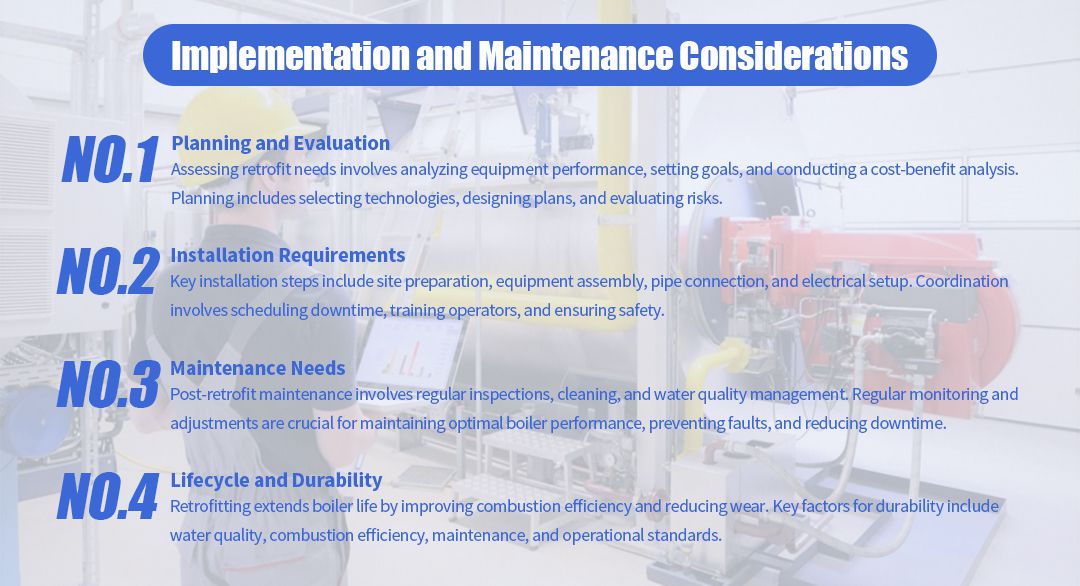
Planning and Evaluation: Assess the performance of oil-fired steam boilers to identify bottlenecks and issues. Define improvement goals, such as enhancing efficiency, reducing emissions, and extending lifespan. Conduct cost-benefit analyses to ensure economic feasibility. Plan improvement strategies by selecting technologies, defining designs, and identifying risks to ensure smooth implementation.
Installation Requirements: Critical aspects of boiler installation include ensuring a solid foundation and compliance with standards. Assemble the boiler and auxiliary equipment according to design drawings and installation instructions, ensuring correct piping and electrical connections. Coordinate production schedules to minimize downtime. Train operators on new equipment and technologies, and develop detailed safety plans to ensure personnel and equipment safety during installation.
Maintenance Needs: Upgraded boilers require regular maintenance to sustain high efficiency. Develop maintenance plans to inspect the boiler and auxiliary components, such as burners and heat exchangers. Regularly clean carbon deposits and soot and manage water quality to prevent scaling. Stock spare parts to address potential failures. Monitor operational parameters in real-time, such as combustion efficiency and exhaust temperature, to make data-driven adjustments and maintain optimal performance. Predict failures to reduce unscheduled downtimes.
Lifecycle and Durability: Upgraded boilers can significantly extend their service life. Enhanced combustion efficiency, reduced emissions, and minimized wear and tear enable boilers to operate efficiently for longer periods while lowering operational costs and improving overall economic benefits. Key factors influencing long-term durability include water quality management, combustion efficiency, maintenance quality, and operational standards. Regular maintenance and inspections help identify and fix issues promptly, preventing major faults. Proper operational methods and standardized procedures reduce human-induced damage to the boiler.
FAQ
How much can be saved on operating costs through improvements?
By improving oil-fired steam boilers through methods such as optimizing combustion techniques, increasing thermal efficiency, adding energy-saving devices (e.g., heat recovery systems), and implementing intelligent control systems, significant reductions in operating costs can be achieved. The specific amount saved depends on the efficiency of the original boiler and the particular improvement measures taken, but typically annual savings can range from tens of thousands to hundreds of thousands of yuan.
What is the typical payback period for boiler improvements?
The payback period for boiler improvements depends on various factors, including the cost of the improvements, the savings in energy costs, the reduction in maintenance costs, and the increase in production efficiency. Generally, efficient improvement schemes can recover investment costs within 2 to 5 years, but the specific payback period needs to be evaluated based on the actual situation of the enterprise.
What government incentives are available to support boiler improvements?
To encourage energy conservation, emission reduction, and industrial upgrading, governments usually provide a series of incentives to support the improvement of boilers and other equipment. These incentives may include financial subsidies, tax breaks, low-interest loans, energy-saving rewards, and green credit schemes. Enterprises should pay attention to relevant policies issued by local governments to obtain specific support measures and application procedures.
How to choose the right improvement method for your boiler?
Selecting the right improvement method for your boiler requires considering various factors, including the boiler model, service life, current efficiency, improvement costs, expected results, and the actual needs of the enterprise. It is advisable to work with professional boiler improvement companies or technical teams to conduct comprehensive evaluations and scheme designs to ensure the relevance and effectiveness of the improvement plan.
What are the most common methods for improving oil-fired steam boilers?
The most common methods for improving oil-fired steam boilers include:
1. Optimizing Combustion Techniques: Utilizing advanced combustion technology and burners, adjusting combustion parameters to increase combustion efficiency, and reducing pollutant emissions.
2. Increasing Thermal Efficiency: Improving the boiler's insulation structure and enhancing heat recovery to increase thermal efficiency.
3. Adding Energy-Saving Devices: Installing heat recovery systems, flue gas purification devices, etc., to recover and utilize energy from exhaust heat and waste gases.
4. Intelligent Control: Installing automated control systems to monitor and adjust the boiler's operating status in real-time, reducing operating costs.
5. Using New Boilers: Depending on actual needs, replacing old boilers with more efficient and environmentally friendly new boilers.
Conclusion
In the highly competitive chemical industry, reducing operating costs is crucial for continuous profitability and enhanced competitiveness. By optimizing production processes, improving equipment efficiency, and reducing energy and raw material waste, enterprises can effectively control costs while ensuring product quality. This not only enhances profitability but also increases resilience to market fluctuations, ensuring long-term stable development. Therefore, chemical plant managers should prioritize cost reduction and consider it a core task of daily management.
Since each chemical plant's situation and needs are different, cost reduction methods should be tailored accordingly. Managers should actively seek external expert assistance to formulate cost reduction plans suitable for their specific circumstances. The expert team at EPCB Boiler can comprehensively analyze and evaluate production processes, equipment conditions, personnel configurations, and other factors to provide targeted and practical suggestions.
If you are looking for effective ways to reduce operating costs and improve boiler efficiency, EPCB Boiler can provide you with solutions to help you move towards a more efficient and greener future for your business.
 Steam Boiler
Steam Boiler Thermal Oil Boiler
Thermal Oil Boiler Hot Water Boiler
Hot Water Boiler Steam Boiler
Steam Boiler Thermal Oil Boiler
Thermal Oil Boiler Hot Water Boiler
Hot Water Boiler Steam Boiler
Steam Boiler Thermal Oil Boiler
Thermal Oil Boiler Hot Water Boiler
Hot Water Boiler Steam Boiler
Steam Boiler Hot Water Boiler
Hot Water Boiler


























